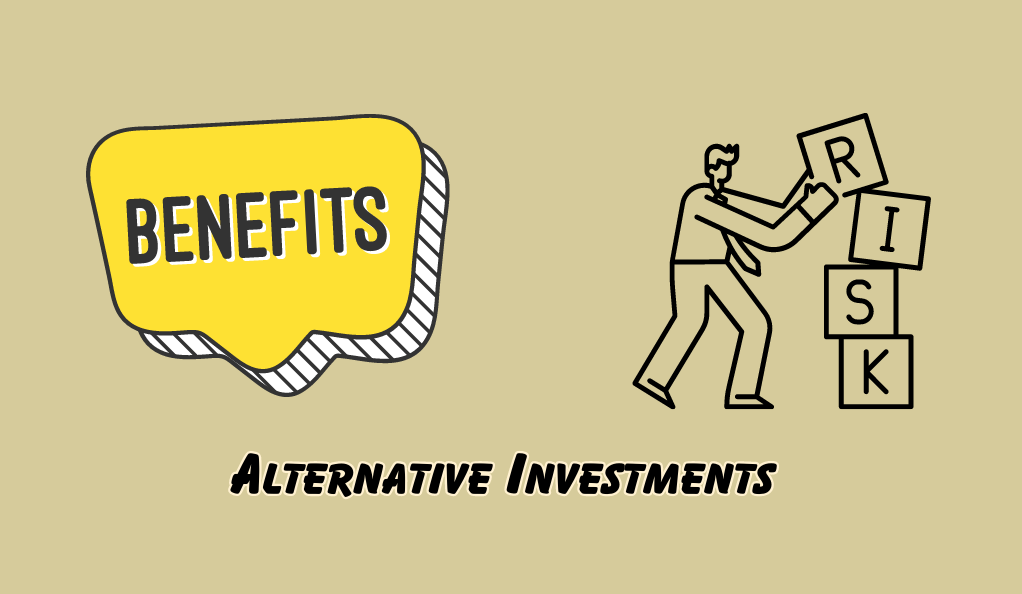Beyond Stocks and Bonds: An Introduction to Alternative Investments
As investors seek to diversify their portfolios and explore avenues beyond traditional stocks and bonds, alternative investments have gained significant attention. These unconventional investment options offer unique opportunities that can potentially enhance returns and mitigate risks. In this article, we’ll take a closer look at what alternative investments are, why they matter, and the types of alternative assets available for investors to consider.
In the realm of finance, traditional investment avenues such as stocks and bonds have long been the go-to choices for many investors. However, in a rapidly changing economic landscape, diversification has become crucial to managing risk and maximizing returns. This is where alternative investments come into play.
Understanding Alternative Investments

Defining Alternative Investments
Alternative investments refer to a broad range of assets that fall outside the traditional categories of stocks, bonds, and cash. These assets can include real estate, private equity, hedge funds, commodities, cryptocurrencies, collectibles, and more. Unlike traditional investments, which are publicly traded on exchanges, alternative investments often involve private markets or unique trading platforms.
Importance of Diversification
Diversification is a fundamental principle in investing. By adding alternative investments to a portfolio, investors can reduce their exposure to the volatility of traditional markets. When stocks and bonds experience downturns, certain alternative assets may retain or even increase in value, providing a cushion against losses.
Types of Alternative Investments
Real Estate
Real estate investments involve purchasing properties for rental income or capital appreciation. This asset class can offer a steady stream of rental income and potential tax benefits.
Private Equity
Private equity involves investing in private companies or taking ownership stakes. It’s known for its potential to generate substantial returns, but it also comes with higher risks and longer investment horizons.
Hedge Funds
Hedge funds pool capital from accredited investors to invest in a diverse range of assets. They aim to generate positive returns regardless of market conditions through various strategies.

Commodities
Commodities include physical assets like gold, oil, and agricultural products. Investing in commodities can provide a hedge against inflation and geopolitical uncertainties.
Cryptocurrencies
Cryptocurrencies like Bitcoin and Ethereum have gained immense popularity as alternative investments. They offer the potential for significant gains but also come with high volatility.
Collectibles
Investing in collectibles such as rare coins, art, and vintage cars can be both financially rewarding and personally fulfilling.
Peer-to-Peer Lending
Peer-to-peer lending platforms connect borrowers with individual lenders. This alternative investment allows investors to earn interest on their loans.
Benefits and Risks of Alternative Investments

Potential for Higher Returns
Many alternative investments have the potential to deliver higher returns compared to traditional investments. For instance, private equity and certain hedge funds aim for substantial profit margins.
Risk and Volatility
Alternative investments often come with higher risks and increased volatility. Investors must carefully assess their risk tolerance before allocating funds.
Limited Liquidity
Unlike stocks and bonds that can be readily sold on exchanges, many alternative investments have limited liquidity. This means investors might face challenges in selling their holdings quickly.
Expertise Required
Investing in alternative assets requires a certain level of expertise. Proper due diligence is essential to understand the intricacies of each asset class.
Factors to Consider Before Investing

Risk Tolerance
Investors should evaluate their willingness and ability to withstand potential losses before venturing into alternative investments.
Investment Goals
Clear investment goals help investors align their alternative investment choices with their financial objectives.
Time Horizon
Alternative investments often have longer holding periods. Consider how long you’re willing to commit your capital.
Due Diligence
Thorough research is critical. Understand the market dynamics, potential returns, and associated risks of any alternative asset.
How to Get Started with Alternative Investments

Research and Education
Educate yourself about different alternative investments. Understanding their mechanics will help you make informed decisions.
Consulting with Financial Advisors
Seek advice from financial professionals who specialize in alternative investments. Their expertise can guide you in making suitable choices.
Starting Small
Consider starting with a smaller allocation to alternative investments. As you gain experience and confidence, you can adjust your portfolio accordingly.
The Future of Alternative Investments
Growing Popularity
Alternative investments are becoming more mainstream as investors seek ways to enhance portfolio performance.
Evolving Regulatory Environment
Regulations surrounding alternative investments are evolving. Stay informed about legal requirements and investor protections.
Conclusion
In an era where financial landscapes are dynamic and unpredictable, embracing alternative investments can be a strategic move. By diversifying your portfolio with assets beyond stocks and bonds, you can potentially achieve better risk-adjusted returns and safeguard your investments against market fluctuations.
FAQs
Alternative investments require careful consideration and may not be suitable for every investor. Assess your risk tolerance before investing.
Alternative investments can complement traditional assets, but they shouldn’t necessarily replace them. A balanced approach is often recommended.
Alternative investments are typically accessed through specialized platforms, brokers, or financial advisors.
Minimum investments vary widely based on the type of alternative asset. Some platforms allow smaller investments, while others require a significant capital commitment.
Alternative investments can act as a hedge against market volatility and economic uncertainties, reducing the overall risk of a portfolio.
